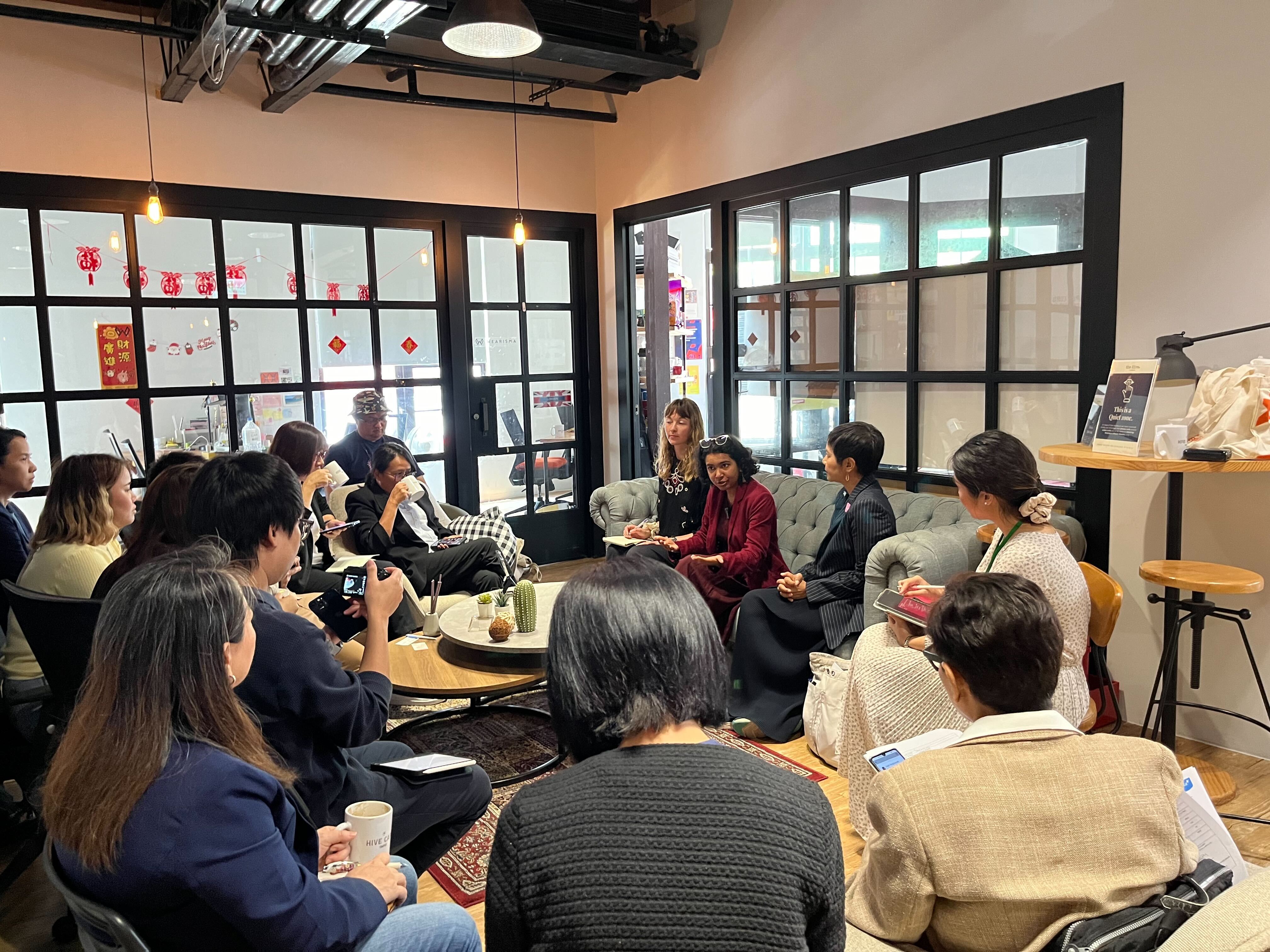Press Freedom
World Press Freedom Day 2024 - Why It Matters and the State of Press Freedom in Asia-Pacific

FNF, CoFact Thailand, and a delegation of Thai journalists conducted interviews with Shataakshi Verma, Project and Development Manager at RSF, and Melina Froidure, Project Assistant at RSF, in Taipei
© FNFTo celebrate World Press Freedom Day 2024, FNF Thailand partners with CoFact Thailand to bring you a special interview with Reporters Without Borders (RSF) based in Taipei City. RSF is a global organization that 'defends the right of every human being to have access to free and reliable information.'
Our interview features experts: Ms. Supinya Klangnarong, Co-Founder of CoFact Thailand, Shataakshi Verma, Project and Development Manager at RSF, and Melina Froidure, Project Assistant at RSF. They discuss what RSF is doing to preserve freedom of press in the Asia-Pacific region.
Why is Press Freedom Important?
Press freedom is fundamental to democracy because it allows citizens to access a wide range of impartial information, essential for informed decision-making in governance. Without it, there is a risk of governments and powerful entities wielding unchecked authority, paving the way for corruption and authoritarianism. Therefore, a free press acts as a crucial check and balance, ensuring transparency and accountability in society.
The State of Press Freedom in Asia-Pacific
According to the latest World Press Freedom Index (2024) released by RSF today, press freedom in the Asia-Pacific region has gotten worse. Out of 32 countries, 26 saw their scores decline. These rankings consider five areas: political climate, social factors, economic environment, legal framework, and journalist safety.
Ms. Verma and Ms. Froidure highlighted the concerning trend revealed by the latest World Press Freedom Index, indicating a tightening stranglehold on freedom of expression and press freedom by governments worldwide. Notably, in North Korea, ranked 177th, and China, ranked 172nd, government control over media is absolute. Similarly, in Vietnam (ranked 174th) and Myanmar (ranked 171st), numerous journalists have faced imprisonment, reflecting a dire state of press freedom. Cambodia, ranked 151st, has witnessed a concerning escalation in government reprisals against journalists, pushing it into the "very serious" press freedom category. The Philippines, ranked 134th, continues to be among the most perilous environments for journalists in the region, with two fatalities reported in 2023.
In 2024, only 1% of the world’s population is living in a country where press freedom is guaranteed
Press Freedom Under Threat in Democracies
Even democracies are not immune to press freedom challenges. In South Korea (62nd), for example, the government threatened several media outlets with lawsuits for alleged defamation. While in Malaysia (107th) the government frequently blocks news websites critical of itself.
However, despite facing difficulties, some regional democracies like Timor-Leste (20th), Samoa (22nd), and Taiwan (27th) continue to be models for press freedom.
RSF's Fight for a Free Press in the Age of AI
Reporters Without Borders (RSF) is actively working to protect press freedom in the evolving digital landscape. On November 10th, 2023, RSF collaborated with 16 organizations to launch the Paris Charter on AI and Journalism at the Paris Peace Forum.
This charter, developed by a commission led by Nobel Peace Prize winner Maria Ressa, establishes ethical principles to safeguard news integrity in the age of Artificial Intelligence (AI). These principles are crucial as AI transforms the media industry.
Building Trust in Journalism: The Journalism Trust Initiative
The Journalism Trust Initiative (JTI) is yet another initiative by RSF. It is designed as an international system that recognizes and rewards ethical journalism practices. Similar to an ISO standard, JTI aims to promote trustworthy journalism that adheres to professional norms. This program is currently being implemented in Thailand, Indonesia, Malaysia, Mongolia, and the Philippines.
How Can We Fight Back Against Fake News?
According to Ms. Verma and Ms. Froidure, organizations can help combat fake news by following RSF`s example and taking the following steps:
- Collaborating with local groups: Gathering information from smaller, local organizations in different countries provides a more comprehensive view of press freedom issues.
- Analysing and publishing data: By collecting and publishing data, organizations can advocates for greater accountability from institutions and media outlets.
- Monitoring attacks: RSF closely monitors attacks on journalists, imprisonments, and the spread of fake news globally. This data helps identify trends and develop solutions.
By working together, large and small organizations can fight for a free and trustworthy press around the world.
To watch the full interview: https://www.facebook.com/CofactThailand/?locale=th_TH
Sky Chatuchinda is the regional communication officer for the Friedrich Naumann Foundation for Freedom.
